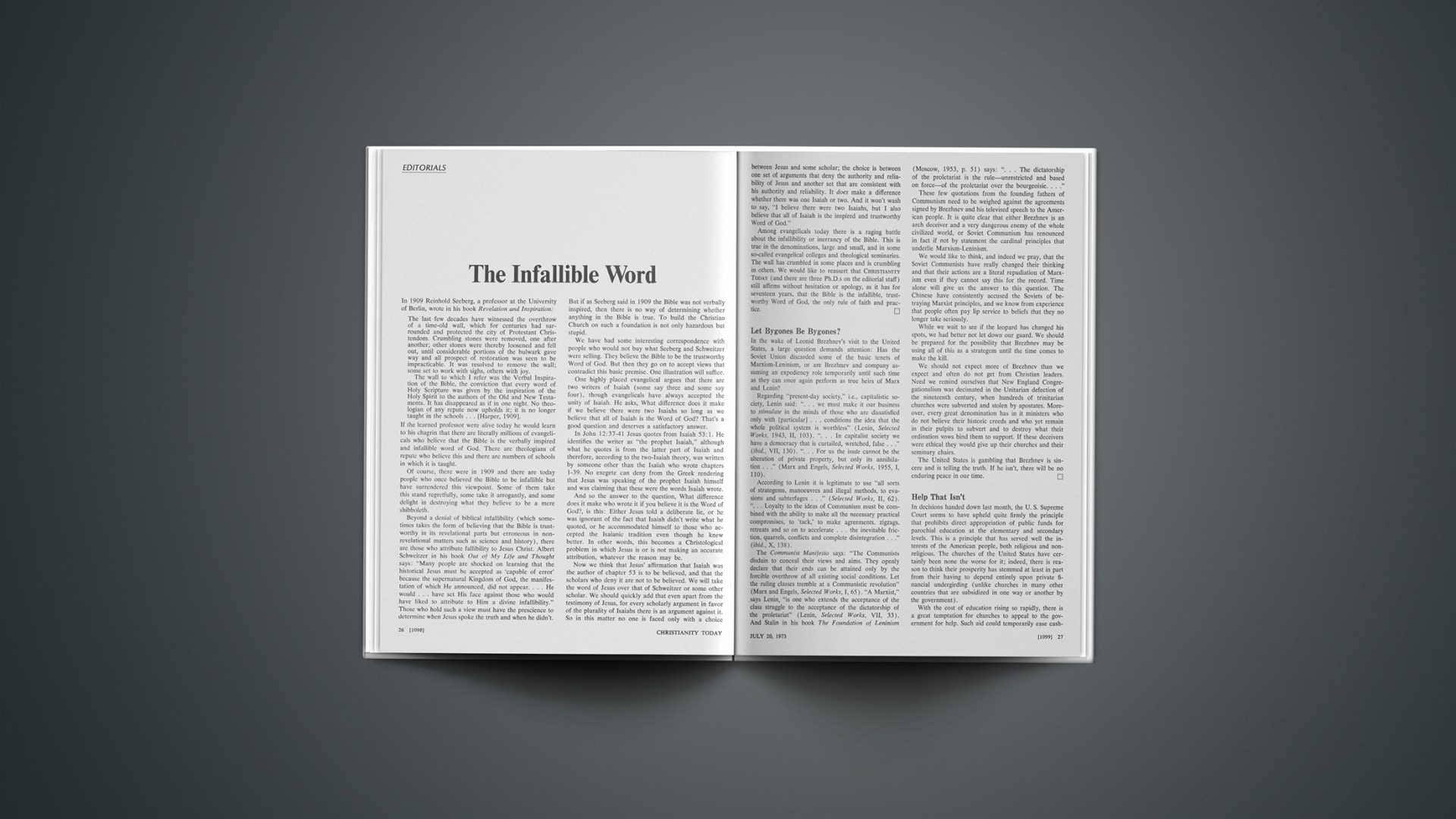In 1909 Reinhold Seeberg, a professor at the University of Berlin, wrote in his book Revelation and Inspiration:
The last few decades have witnessed the overthrow of a time-old wall, which for centuries had surrounded and protected the city of Protestant Christendom. Crumbling stones were removed, one after another; other stones were thereby loosened and fell out, until considerable portions of the bulwark gave way and all prospect of restoration was seen to be impracticable. It was resolved to remove the wall; some set to work with sighs, others with joy.
The wall to which I refer was the Verbal Inspiration of the Bible, the conviction that every word of Holy Scripture was given by the inspiration of the Holy Spirit to the authors of the Old and New Testaments. It has disappeared as if in one night. No theologian of any repute now upholds it; it is no longer taught in the schools … [Harper, 1909].
If the learned professor were alive today he would learn to his chagrin that there are literally millions of evangelicals who believe that the Bible is the verbally inspired and infallible word of God. There are theologians of repute who believe this and there are numbers of schools in which it is taught.
Of course, there were in 1909 and there are today people who once believed the Bible to be infallible but have surrendered this viewpoint. Some of them take this stand regretfully, some take it arrogantly, and some delight in destroying what they believe to be a mere shibboleth.
Beyond a denial of biblical infallibility (which sometimes takes the form of believing that the Bible is trustworthy in its revelational parts but erroneous in non-revelational matters such as science and history), there are those who attribute fallibility to Jesus Christ. Albert Schweitzer in his book Out of My Life and Thought says: “Many people are shocked on learning that the historical Jesus must be accepted as ‘capable of error’ because the supernatural Kingdom of God, the manifestation of which He announced, did not appear.… He would … have set His face against those who would have liked to attribute to Him a divine infallibility.” Those who hold such a view must have the prescience to determine when Jesus spoke the truth and when he didn’t. But if as Seeberg said in 1909 the Bible was not verbally inspired, then there is no way of determining whether anything in the Bible is true. To build the Christian Church on such a foundation is not only hazardous but stupid.
We have had some interesting correspondence with people who would not buy what Seeberg and Schweitzer were selling. They believe the Bible to be the trustworthy Word of God. But then they go on to accept views that contradict this basic premise. One illustration will suffice.
One highly placed evangelical argues that there are two writers of Isaiah (some say three and some say four), though evangelicals have always accepted the unity of Isaiah. He asks, What difference does it make if we believe there were two Isaiahs so long as we believe that all of Isaiah is the Word of God? That’s a good question and deserves a satisfactory answer.
In John 12:37–41 Jesus quotes from Isaiah 53:1. He identifies the writer as “the prophet Isaiah,” although what he quotes is from the latter part of Isaiah and therefore, according to the two-Isaiah theory, was written by someone other than the Isaiah who wrote chapters 1–39. No exegete can deny from the Greek rendering that Jesus was speaking of the prophet Isaiah himself and was claiming that these were the words Isaiah wrote.
And so the answer to the question, What difference does it make who wrote it if you believe it is the Word of God?, is this: Either Jesus told a deliberate lie, or he was ignorant of the fact that Isaiah didn’t write what he quoted, or he accommodated himself to those who accepted the Isaianic tradition even though he knew better. In other words, this becomes a Christological problem in which Jesus is or is not making an accurate attribution, whatever the reason may be.
Now we think that Jesus’ affirmation that Isaiah was the author of chapter 53 is to be believed, and that the scholars who deny it are not to be believed. We will take the word of Jesus over that of Schweitzer or some other scholar. We should quickly add that even apart from the testimony of Jesus, for every scholarly argument in favor of the plurality of Isaiahs there is an argument against it. So in this matter no one is faced only with a choice between Jesus and some scholar; the choice is between one set of arguments that deny the authority and reliability of Jesus and another set that are consistent with his authority and reliability. It does make a difference whether there was one Isaiah or two. And it won’t wash to say, “I believe there were two Isaiahs, but I also believe that all of Isaiah is the inspired and trustworthy Word of God.”
Among evangelicals today there is a raging battle about the infallibility or inerrancy of the Bible. This is true in the denominations, large and small, and in some so-called evangelical colleges and theological seminaries. The wall has crumbled in some places and is crumbling in others. We would like to reassert that CHRISTIANITY TODAY (and there are three Ph.D.s on the editorial staff) still affirms without hesitation or apology, as it has for seventeen years, that the Bible is the infallible, trustworthy Word of God, the only rule of faith and practice.










